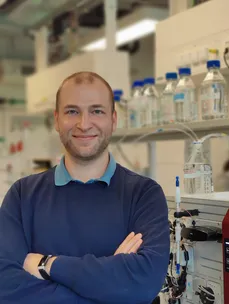
Eike Kristian Theel, M.Sc.
Ph.D. Student
Technical University of Munich
TUM School of Engineering and Design
Chair for Bioseparation Engineering
Lichtenbergstraße 4a
85748 Garching
| Phone: | +49.89.289.52764 |
| Fax: | +49.89.289.15766 |
| Room: | 1013 |
| E-Mail: | eike.theel@tum.de |
Eike Theel completed his Bachelor's degree as an engineer in Biotechnology at Hochschule Weihenstephan-Triesdorf (HSWT), followed by a Master’s degree in Pharmaceutical Bioprocess Engineering at the Technical University of Munich (TUM). For his Bachelor’s thesis, he conducted research at GE Healthcare in Uppsala, Sweden, developing high-throughput screening methods for chromatographic stationary phases. Additionally, he worked as a working student in process development for producing Bispecific T-Cell Engagers (BiTEs) at Amgen Research in Munich. During his Master’s studies, Eike Theel served as a tutor in Experimental Physics and Molecular Biology Methods. His Master’s thesis research at the Chair of Bioseparation Engineering (BioSE) focused on developing a module for potential-controlled separation methods. Now in his Ph.D., he is dedicated to advancing this new technology for industrial scale purifying biological therapeutics.
Project
Affinity chromatography resins coated with Protein A ligands are the industry standard for large-scale antibody purification, thanks to the high selectivity provided by the strong ligand-antibody interaction. However, these resins are costly and require acidic elution conditions (pH < 3.5), which can lead to ligand and antibody degradation. To address these limitations, this project explores a novel approach: Potential-controlled Affinity Membrane Chromatography (pcAMC). In pcAMC, electric fields are applied to release bound biomolecules from affinity ligands, allowing for a highly efficient and milder elution process. Prior research by Tobias Steegmüller demonstrated the feasibility of this method as a gentle alternative to traditional pH-based elution. This project aims to adapt and optimize pcAMC for large-scale purification of pH-sensitive biotherapeutics, promoting both economic viability and environmental sustainability in bioprocessing.